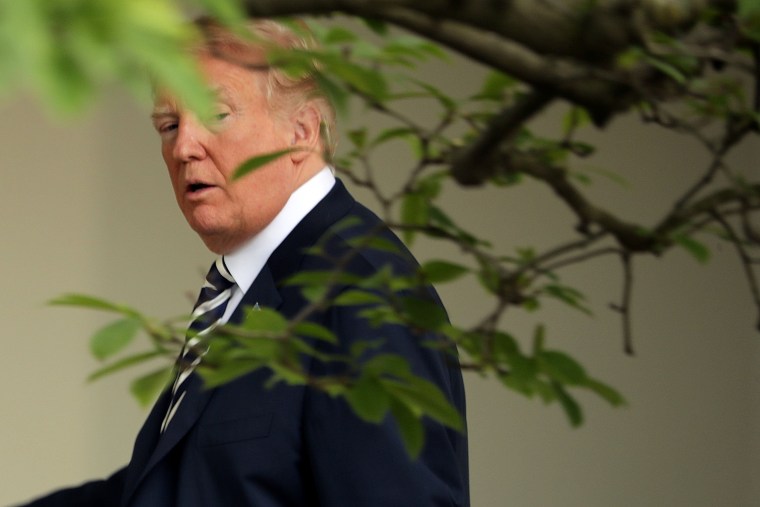WASHINGTON — President Donald Trump is working to head off a confrontation with members of his own party on trade, personally reaching out to senators to express his opposition to legislation that would tie his hands on tariffs.
On Wednesday morning, Trump called Sen. Bob Corker, R-Tenn., to say he opposed the senator's introduction of legislation that would give Congress oversight of tariffs.
Corker said that he listened, but declined to drop the push.
“I’ve got a job to do," he said. "I’m a United States senator, and this is our responsibility."
The legislation was crafted after Trump announced tariffs on U.S. allies Mexico, Canada and the European Union. Trump cited national security, also known as section 232, for his reason for imposing the tax on goods.
Corker’s bill would require congressional approval for any tariffs that are imposed for national security purposes. He’s hoping to offer it as an amendment to a must-pass defense authorization bill that is expected to come to the Senate floor this week.
Senate Majority Leader Mitch McConnell, who has been reluctant to buck the president, has yet to commit to bringing Corker’s amendment for a vote.
Trump's top economic adviser, Larry Kudlow, defended the president’s trade tactics against Canada and other allies, telling reporters at the White House press briefing Wednesday that the president is determined to equalize the playing field and not start trade wars.
“He regards himself as a free trader. But until we can deal with these unfair practices and so forth, we will not have fair trade. Until we can have reciprocal relationships, we will not have free trade, we will not have fair trade,” Kudlow said.
But the president’s pressure campaign appears to be having an impact on a party that has traditionally been opposed to trade barriers. Even though at least seven Republicans have already signed on to Corker’s measure, many Republicans on Capitol Hill who express concern about tariffs are hesitant to legislate oversight of the president.
Sen. Lindsey Graham, R-S.C., came away from a meeting with Trump opposed to Corker's legislation.
“Now is not the time to undercut President Trump’s ability to negotiate better trade deals. I will not support any efforts that weaken his position," Graham said in a statement after his meeting. “I strongly believe there is a plan in place to lead us to better trade deals. We should give the president the time and ability to achieve his goals.”
Sen. John Kennedy, R-La., said that he has not yet decided whether he’d support Corker’s proposal. He and other senators speculate that it’s an effort to get better bilateral trade agreements or that it’s an attempt to raise pressure for a renegotiated NAFTA. They also say that China’s influence in North Korea plays a role in the president's thinking on the trade disputes.
“I still believe that the president is too smart to get us into a trade war and that this is all horse trading. And I think he deserves some latitude in terms of doing that,” Kennedy said. “Now, if there comes a time that I realize it’s not just horse trading and he’s serious about starting a trade war, then I reserve the right to reconsider.”
And after Trump's meeting with Republicans at the White House Tuesday to discuss trade and talked to Trump on the phone Wednesday morning, Sen. David Perdue, R-Ga., who is opposed to tariffs, said that he now understands the president’s process.
“We had really an open and honest conversation about trade, foreign relations, military and so forth and that’s what this is coming to — you just can’t deal with trade in a silo. You have to deal with it in a comprehensive way, and I think that’s what Trump’s trying to do,” Perdue said.
Outside groups, however, are pushing Republicans to support Corker's legislation.
The U.S. Chamber of Commerce is siding with Corker, calling the “modest” congressional oversight he's proposing “welcome and long overdue.”
“The constitutional authority of the Congress to ‘regulate foreign trade’ and its oversight of tariff policy is unambiguous," said Neil Bradley, Chamber of Commerce executive vice president.
And Koch Industries is also supporting Corker's proposal, which Philip Ellender, the company's president of government and public affairs, said "helps restore Congress’ constitutional authority on matters of trade."
